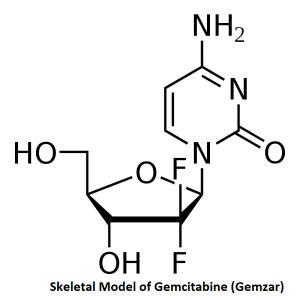 Gemcitabine, US brand name Gemzar, is an anti-cancer chemotherapy drug and belongs to the class of drugs known as antimetabolite. Antimetabolites are cell-cycle specific and they attack at specific phases in the cycle. It is effective in treating non-small-cell lung cancer for patients whose disease cannot be removed by surgery. It is also used to treat cancers of ovary, pancreas, and breast.
Gemcitabine, US brand name Gemzar, is an anti-cancer chemotherapy drug and belongs to the class of drugs known as antimetabolite. Antimetabolites are cell-cycle specific and they attack at specific phases in the cycle. It is effective in treating non-small-cell lung cancer for patients whose disease cannot be removed by surgery. It is also used to treat cancers of ovary, pancreas, and breast.
How Is It Given?
This medication is given as an injection into a vein, once weekly for several weeks. There is no pill form of Gemcitabine. The duration of treatment depends on a number of factors like the type of cancer, severity of cancer, how well the drug is working, ability to tolerate the medication and more. Your doctor will recommend the dosage and schedule.
Side Effects:
Some people may not experience all of the side effects listed here. The side effects are almost reversible and go away when treatment is complete. These vary from person to person and there’s no relationship between the side effects and effectiveness of taking this drug.
The following side-effects are common for patients:
- Muscle pain
- Fever
- Fatigue
- Low blood counts
- Headache
- Poor appetite
- Skin rash
- Build-up of fluid
- Tiredness
Less common side effects for patients receiving this drug include:
- Diarrhea
- Difficulty in sleeping
- Mouth sores
- Constipation
- Blood clot risk
- Hair loss
- Shortness of breath
Precautions:
Before starting Gemcitabine treatment, you should tell your doctor about the medications you are taking. You should inform your health care professional if you are pregnant or may be pregnant. Women should not breast feed. Both men and women should not conceive a child while taking the medicine. You should avoid any contact sports or activities that can result in injury.
The information listed here is for educational purposes only and is not a substitute for medical advice. The details may not cover all possible uses or side effects of this drug. Please contact your health care professional for more details about your specific condition.
